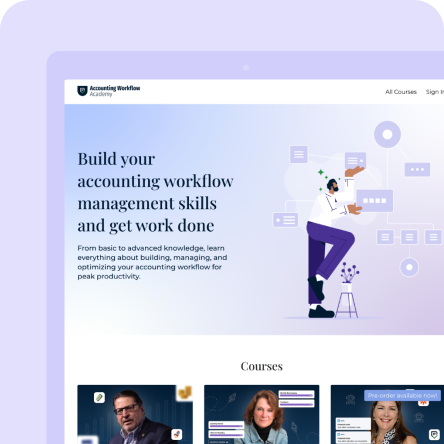These days, many organizations are trying to shift their culture to one where employees take ownership of their work, including its successes and failures. A culture of accountability is directly tied to employees’ capacities and can affect organizational efficiency.
Certain characteristics set accountable employees apart from the rest. They acknowledge mistakes and failures and take full responsibility rather than passing the blame. Accountable employees also honor their commitments and deliver on them.
These characteristics are especially valuable for employees in accounting firms. Such individuals deal with valuable client data and information that can make or break the firms’ success. By having good CPA practice management, firms can better manage employees with the help of workflows and collaborative efforts for even more successful delivery of services.
Creating a Culture of Accountability in CPA Firms
To create a culture of accountability in any firm, leadership should consistently reward certain behaviors. Building this culture can be done through the following:
1. Make Sure Goals and Expectations are Clear
Your employees will not know how to show accountability if they don’t know what they’re accountable for. Be explicit with the results you expect with something as simple as setting goals that are “SMART”—specific, measurable, achievable, results-oriented, and time-bound.
You can also use something like capacity management or workflow management tools, which track the whole project and your employee’s goals and tasks. Using a CPA practice management software, that is tailored to your industry and specific niche needs, can incorporate the strongest aspects of general tools that are typically built to accommodate organizations that use a traditional sales-led business model.
2. Measure and Review Results
When measuring your organizational efficiency, how well everybody does at their current capacity will dictate your performance. Consistently measuring, tracking, and reviewing results with employees is necessary for them to succeed and contribute to the firm’s goals. Whether it’s implementing an accounting project management software or a different set of goals, keeping track of everybody’s job responsibilities, performance, and the company’s status as a whole all play into each other.
Using the right tools, systematically review your employee’s progress with weekly one-on-one meetings to ensure they’re kept on track. While this may seem like a high frequency, revisiting goals often can make sure that your team works to achieve goals consistently. However, measuring long term goals can be done with less frequent meetings.
Try to meet at least once a month, and measure the most important aspects contributing to the organization’s outcome. Using a CPA practice management tool helps by prioritizing the most important goals, your employees will learn to do the same.
If your team members are falling behind on their targets, they will need to draft a development plan to address performance gaps. Asking the employee what will help them succeed rather than berating them for any lapses is the best approach.
It may also be possible that you’ve overlooked your capacity management spread and overloaded this person. Delegating may be part of the solution here and should be noted in the employee’s action steps.
3. Delegate Authority
Delegating is something that many managers are hesitant to do when they don’t fully trust their team. This may happen more often in an accounting firm, given that the stakes are higher in this particular industry. Giving your team members a chance to be accountable for key decisions that the organization needs to make will allow them to rise to the occasion.
However, this isn’t to say that you should delegate for the sake of doing so. Ensure that your employee has the character and competency to deliver on the most important tasks. Delegating less important projects can be done for employees whose performance needs improvement.
Part of delegating is empowering your employees to perform well. Use all the resources at your disposal to ensure that your team functions like a well-oiled machine. A tool such as a workflow software for accountants and bookkeepers will help you collaborate, keep track of tight deadlines, and streamline your workflow procedures to deliver results.
Conclusion
Capacity planning is another way of describing how well you have delegated the right tasks to the right people in your accounting firm. By empowering them with the right accounting management practices, software tools, and mindset, you’ll see results much faster.
Accountancy is all about precision and effectiveness. Your employees should get the same attention to detail so they can claim accountability for the shared success of your well-performing firm.
Here at Financial Cents, we offer cloud-based accounting solutions to make your practice management easier.
Start your free trial for our Capacity Management solution today!




